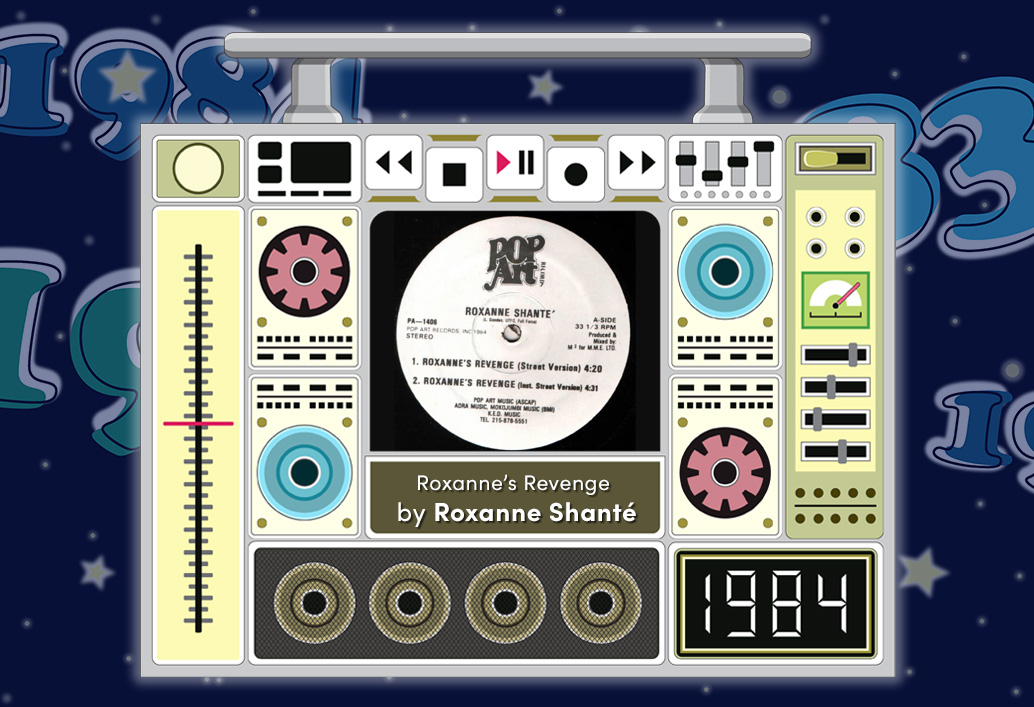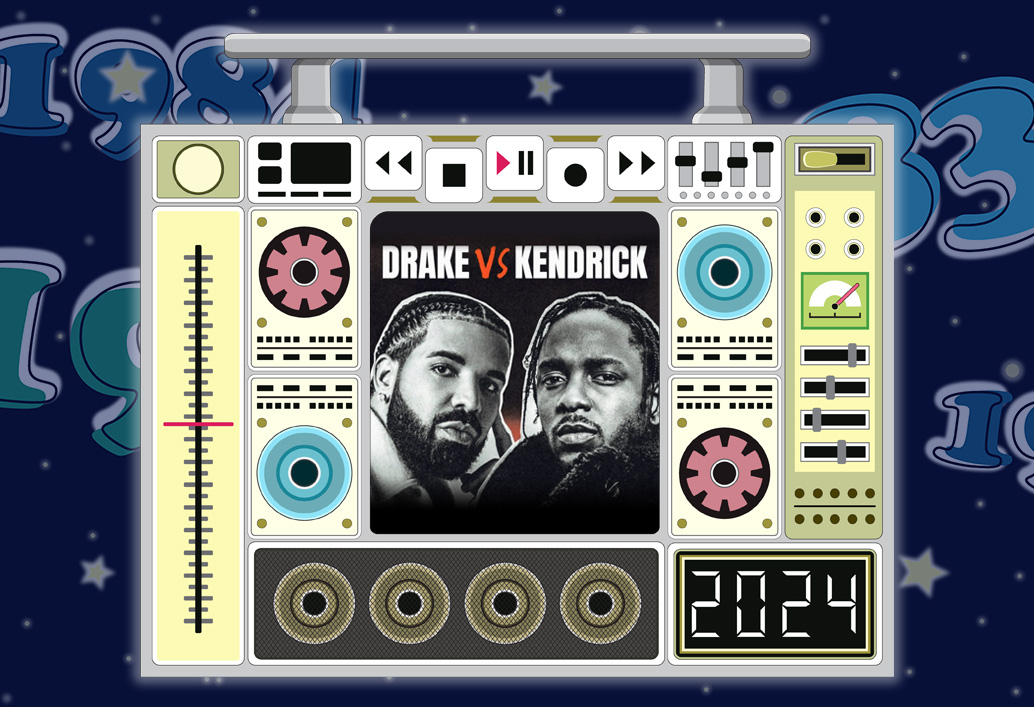
Roxanne’s Revenge: Roxanne Shanté – 1984
Hey, y’all! ceetay here! Okay, let’s cut to my lame excuse. I had to move
Hey, yo! Wassup!? You doin’ okay? Good. Let’s not waste anymore time. I got this thing up and runnin’ and I’m itchin’ to put this time machine into action. Need to be careful, though. We gotta wait for the right time to jump to the right moment like Double Dutch. Alright!? Alright, now press that button. The red play button. Yeah, that one. Hit it!
Our first stop takes us back to the year 1979. I was around eight years old. Rap was the new form of music that captured my imagination. It was fascinating to hear guys and girls talking to the rhythm of a Disco beat, before Disco became a dirty word in the U.S. Look at it this way. In the 1970s, Disco was like Star Wars – Episode 4: A New Hope (it was just Star Wars). No one could escape it. It was so huge there was a Disco version of the theme… it was at the Number 1 spot on Billboard for 2 weeks.
When Rap came along, it was like Empire Strikes Back, a sequel that used the same elements, but with a different twist. Just like Empire, Rap would eventually considered to be better than its predecessor. There were two big reasons for that. One of them was focusing the entire rap record on the “break”, a musical interlude stripped down to the rhythm (drums, bass, bongos, etc.) from Disco hits. The other was hearing the vocalist talk, not sing their lyrics and those lyrics had to rhyme. The way those emcees creatively connected words in time with the music was magical to me. Rap would also eventually overtake Disco’s dominance in the music mainstream in ways even I never thought was possible. How could I? In in 1979, buying a rap album was impossible. There were only Rap 7 and 12 inch singles located in the Disco section in a thing called a record store.
When Disco started to crash and burn during a 1979 Chicago White Sox Disco Demolition Night promotion, black artists’ crossover dreams burned along with it. The infamous backlash was so bad it took two years for an R&B song to reach #1 on the charts. It was Lionel Ritchie and Diana Ross’ duet ballad Endless Love, a theme song from a movie starring teen sensation, Brooke Shields.
Although I found Disco’s death spiral alarming, I kind of felt relieved knowing Rap and Hip Hop were safe from the onslaught and were left alone. Let New Wave, Synth Pop and Heavy Metal hair bands take the spotlight. I’d rather listen to my Rap records, I mean my brother’s Rap records, on my record player down in my basement. That was good enough for me.
Why Rap? Why didn’t I listen to R&B or Funk or Dance music (or Garage, name taken from the NY club Paradise Garage)? I did. I also listened to all that other stuff I mentioned in the previous paragraph. Well, excluding the Heavy Metal bands. Hip Hop spoke to me on a deeper level. It spoke to something other music genres weren’t addressing. It was a rebellious reaction to NYC’s blatant neglect to poor communities.
This was a time when the NY Daily News’s headline declared Pres. Gerald Ford told NYC to “Drop Dead”. The Big Apple was more like Humpty Dumpty, teetering dangerously into bankruptcy. What was the city’s response? Cut music, art and other “frivolous” subjects from all public schools. And what was the kids’ response? “We’ll make our own music and art our damn selves!” And they did. Stealing electricity from streetlights to power up mics, stereo equipment and turntables. Sneaking into subway yards to spray paint their art on subway trains. Breaking out the linoleum anywhere the urge to battle and find out which crew had the most death defying dance moves. The overall message was clear: “We will not be ignored!” In a sense, Hip Hop was the spirit of Generation X. Often degraded, discounted and discarded. Left to fend for ourselves.
You understand now? Good. Let’s head on back to 2023.
Did you enjoy our first trip back? You want to do it again? You did? Great!
I’d asked if you wanna go again, but there’s this little button next to the power converter I need to fix. If I don’t, people today will think Sugar Hill Gang’s Rapper’s Delight was the first rap song ever recorded. Hold Up. They already do? Dammit! Gotta fix that!
Anywho, I’m ceetay, your time travel guide to the old school. Catcha next time! Seeeee Yaaaaa!
In between much needed time travel arrangements, and maintenance, ceetay‘s off-time consists of sitcom TV watching, Mint Chocolate Chip ice cream eating and gathering thoughts and information about old school music that have been either forgotten or buried under mountains of predatory corporate copyright claims. If you ever find yourself standing close enough, you might catch ceetay muttering, “If creativity is not allowed to be inspired by its history, culture will inevitably lose its meaning.”
Hey, yo! Wassup!? You doin’ okay? Good. Let’s not waste anymore time. I got this thing up and runnin’ and I’m itchin’ to put this time machine into action. Need to be careful, though. We gotta wait for the right time to jump to the right moment like Double Dutch. Alright!? Alright, now press that button. The red play button. Yeah, that one. Hit it!
Our first stop takes us back to the year 1979. I was around eight years old. Rap was the new form of music that captured my imagination. It was fascinating to hear guys and girls talking to the rhythm of a Disco beat, before Disco became a dirty word in the U.S. Look at it this way. In the 1970s, Disco was like Star Wars – Episode 4: A New Hope (it was just Star Wars). No one could escape it. It was so huge there was a Disco version of the theme… it was at the Number 1 spot on Billboard for 2 weeks.
When Rap came along, it was like Empire Strikes Back, a sequel that used the same elements, but with a different twist. Just like Empire, Rap would eventually considered to be better than its predecessor. There were two big reasons for that. One of them was focusing the entire rap record on the “break”, a musical interlude stripped down to the rhythm (drums, bass, bongos, etc.) from Disco hits. The other was hearing the vocalist talk, not sing their lyrics and those lyrics had to rhyme. The way those emcees creatively connected words in time with the music was magical to me. Rap would also eventually overtake Disco’s dominance in the music mainstream in ways even I never thought was possible. How could I? In in 1979, buying a rap album was impossible. There were only Rap 7 and 12 inch singles located in the Disco section in a thing called a record store.
When Disco started to crash and burn during a 1979 Chicago White Sox Disco Demolition Night promotion, black artists’ crossover dreams burned along with it. The infamous backlash was so bad it took two years for an R&B song to reach #1 on the charts. It was Lionel Ritchie and Diana Ross’ duet ballad Endless Love, a theme song from a movie starring teen sensation, Brooke Shields.
Although I found Disco’s death spiral alarming, I kind of felt relieved knowing Rap and Hip Hop were safe from the onslaught and were left alone. Let New Wave, Synth Pop and Heavy Metal hair bands take the spotlight. I’d rather listen to my Rap records, I mean my brother’s Rap records, on my record player down in my basement. That was good enough for me.
Why Rap? Why didn’t I listen to R&B or Funk or Dance music (or Garage, name taken from the NY club Paradise Garage)? I did. I also listened to all that other stuff I mentioned in the previous paragraph. Well, excluding the Heavy Metal bands. Hip Hop spoke to me on a deeper level. It spoke to something other music genres weren’t addressing. It was a rebellious reaction to NYC’s blatant neglect to poor communities.
This was a time when the NY Daily News’s headline declared Pres. Gerald Ford told NYC to “Drop Dead”. The Big Apple was more like Humpty Dumpty, teetering dangerously into bankruptcy. What was the city’s response? Cut music, art and other “frivolous” subjects from all public schools. And what was the kids’ response? “We’ll make our own music and art our damn selves!” And they did. Stealing electricity from streetlights to power up mics, stereo equipment and turntables. Sneaking into subway yards to spray paint their art on subway trains. Breaking out the linoleum anywhere the urge to battle and find out which crew had the most death defying dance moves. The overall message was clear: “We will not be ignored!” In a sense, Hip Hop was the spirit of Generation X. Often degraded, discounted and discarded. Left to fend for ourselves.
You understand now? Good. Let’s head on back to 2023.
Did you enjoy our first trip back? You want to do it again? You did? Great!
I’d asked if you wanna go again, but there’s this little button next to the power converter I need to fix. If I don’t, people today will think Sugar Hill Gang’s Rapper’s Delight was the first rap song ever recorded. Hold Up. They already do? Dammit! Gotta fix that!
Anywho, I’m ceetay, your time travel guide to the old school. Catcha next time! Seeeee Yaaaaa!
In between much needed time travel arrangements, and maintenance, ceetay‘s off-time consists of sitcom TV watching, mint chocolate chip ice cream eating and gathering thoughts and information about old school music that have been either forgotten or buried under mountains of predatory corporate copyright claims. If you ever find yourself standing close enough, you might catch ceetay muttering, “If creativity is not allowed to be inspired by its history, culture will inevitably lose its meaning.”

Hey, y’all! ceetay here! Okay, let’s cut to my lame excuse. I had to move

Wassup! ceetay here, the Doc Brown to your Marty McFly. Okay, I’ll just cut to